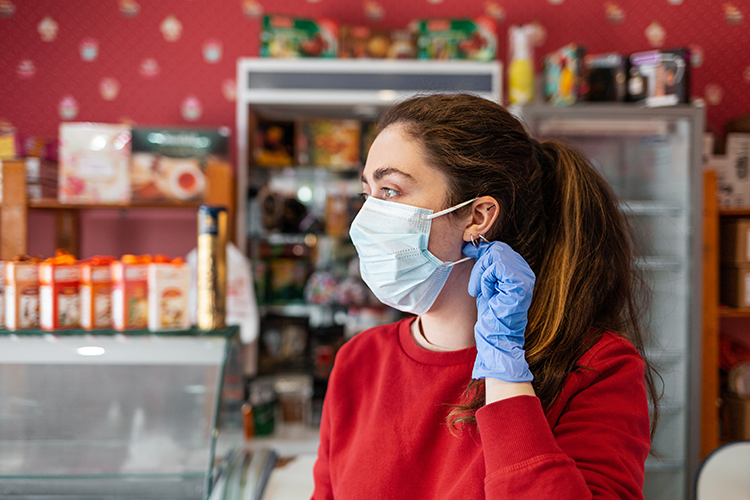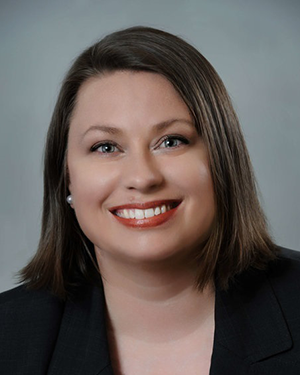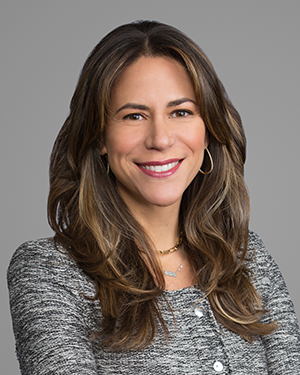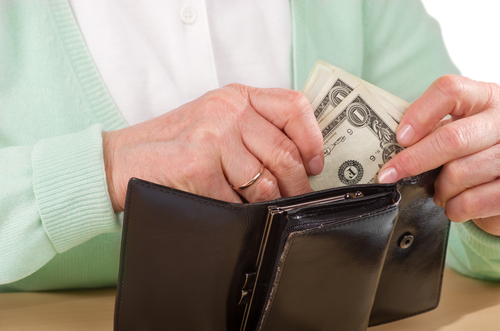Small businesses have COVID-19 questions, and the legal profession is working to answer them

Image from Shutterstock.com.
Small businesses are struggling. It’s been more than three months since the COVID-19 pandemic forced them to shut down, send their employees home and get by on little-to-no income.
The federal government tried to help with the Coronavirus Aid, Relief and Economic Security Act and its $660 billion Paycheck Protection Program, which was designed to help small businesses keep their employees on the payroll. However, as the New York Times and others have reported, many find the loan program confusing and need help navigating its complicated requirements.

Lana Kleiman.
“The PPP loan process wasn’t exactly very smooth,” says Lana Kleiman, the executive director of Charleston Legal Access, a nonprofit law firm that serves moderate- and low-income individuals in South Carolina. “It was rolled out in many different stages. It changed. It evolved. There was money. There was no money. Then there was money again.
“I think a lot of people, even as many big law firms and others put out webinars, still have questions that are personal to their organization and their business.”
Charleston Legal Access is one of several nonprofit and legal service organizations that are partnering with law firms in an effort to provide small businesses with answers to their questions about federal stimulus program benefits and other legal issues arising out of the pandemic.
Through its Lowcountry COVID-19 Small Business/Non-Profit Legal Clinic, Charleston Legal Access works with Am Law 100 firms Nelson Mullins Riley & Scarborough and Jackson Lewis as well as fellow nonprofit Lowcountry Local First to provide free legal advice to local businesses with 25 or fewer employees during 45-minute telephone or video calls. They also assist other nonprofit organizations.
The clinic is one of eight launched and supported by the Lawyers for Good Government Foundation, a nonprofit network of more than 125,000 legal advocates, throughout the country starting in New York City and extending as far as Washington state. It provides the clinic framework, client intake form templates and an online database, which is used to assign client matters to volunteer attorneys and track the outcome of those matters.
“It is designed to make it as easy as possible for local nonprofit organizations and the supporting law firms to get a clinic for small businesses up and running remotely in the midst of a crisis without having to worry about all of the logistics and system issues that often prevent projects like this from coming to fruition,” says Traci Feit Love, Lawyers for Good Government’s executive director.
Other organizations are also stepping forward to help small businesses with their legal needs during the COVID-19 pandemic. In New York, a group of law firms and legal aid organizations launched the Small Business Legal Relief Alliance to offer free counsel by telephone to small businesses, cooperatives, nonprofits and individuals who are self-employed.

Erica Spangler Raz.
And in Chicago, the Chicago Lawyers’ Committee for Civil Rights teamed up with four member firms to open its free Virtual Legal Clinic for Small Businesses & Nonprofits. The Committee has provided legal services to minority-owned businesses since 1969, and the new clinic is an extension of that work, says senior counsel Erica Spangler Raz, who directs the Pro Bono Works program.
“We have a health pandemic first, then there is the economic impact of the health pandemic,” she says. “It’s disproportionately affecting the communities that we serve, and now, with everything else that is going on, there is actually awareness about it. That’s leading to more people wanting to help Black-owned businesses and Latinx-owned businesses.”
Matter of concern
In Connecticut, Lawyers for Good Government partnered with the Connecticut Bar Association and Am Law 200 firm Robinson+Cole to form the COVID-19 Small Business Virtual Legal Clinic.
As expected, restaurants, jewelers and many other small businesses have asked how to access loan and grant programs and what they can do with those funds once they are received, says Peter Knight, Robinson+Cole’s pro bono partner, who works in the Hartford office and helps distribute requests to a group of more than 50 volunteer attorneys.

Peter Knight.
According to Knight, he sees every matter that comes into the clinic, including a recent matter where a personal trainer needed help with waiver language in contracts with her clients and another one where the owner of a yoga studio wanted to know how to handle outstanding gift certificates if forced to shut down. He adds that as more small businesses plan to reopen, they are asking for best practices on when and how to bring back staff.
“People are awfully concerned about any liability they might be exposed to in terms of operating at this point and God forbid, someone contracts the virus,” Knight says. “What that means to their business.”
Meanwhile, the Chicago Lawyers’ Committee for Civil Rights’ Spangler Raz is now fielding questions about commercial leases. She points out that many small businesses were unable to pay rent while they were closed in April and May and need assistance reviewing and renegotiating their leases. Others know they need to shutter permanently and ask how they can terminate their leases.
She says one volunteer attorney went beyond what is usually a 30-minute remote consultation to help a business owner draft and negotiate a lease termination agreement and work with her landlord to make sure the movers she hired met his insurance requirements.
Nonprofits have submitted questions about furloughs and layoffs, as well as about contracts for fundraising events that were canceled as a result of the pandemic, Spangler Raz says. They want to terminate those contracts, but also worry they won’t be able to ask for the return of nonrefundable deposits.
Spangler Raz also expects more questions about bankruptcy in the coming months.
“I have had one so far, but I think they are going to come in, unfortunately,” she says. “Small businesses have been in a holding pattern because they don’t know whether they can continue to operate.”
Charleston Legal Access’s Kleiman agrees that the questions she sees in South Carolina will evolve as small businesses and nonprofits determine whether they can survive the effects of the pandemic. Like many others, the clinic will remain open indefinitely to meet the need.

Norah Rogers.
There has also been no shortage of volunteer attorneys. She credits Norah Rogers, the firmwide pro bono administrator at Nelson Mullins, for spearheading efforts behind the Lowcountry clinic after helping Lawyers for Good Government recruit nonprofit organizations and lead law firms for its programs in North Carolina, Georgia and Florida.
“I didn’t know how it would go with everyone being remote and everyone having such unusual situations with family or illness,” says Rogers, who works in Columbia, South Carolina. “But honestly, I think it was easier to get volunteers for this rather than times when everyone is traveling and extremely busy. More people were like, ‘Yes, I want to give back, I want to do this.’”
 Allison Yacker.
Allison Yacker.Allison Yacker, a partner in Katten Munchin Rosenman’s New York office, experienced something similar as she worked to recruit volunteers to join the Small Business Legal Relief Alliance’s efforts.
She says she felt compelled to get involved because the pandemic “hit home for me, New York being an epicenter of the virus.” She was overwhelmed by the number of partners in her firm who felt the same way.
“What I tried to impress upon my colleagues is if any of us want to return to work and see a vision of New York that reminds us of what it looked like pre-COVID, then we all have to roll up our sleeves and do our part,” she says. “We all have to help these New York businesses stay in business.”
Sidebar
Commonly Asked Questions
(The answers to these questions could vary depending on jurisdiction or the business’s circumstances, so only the questions are provided.)
- What’s the difference between a PPP and EIDL loan, and how can I apply?
- I have an employee who has been offered her position back but won’t agree to return to work due to COVID concerns—what do I do?
- Can I get a draft of a waiver of liability form that will protect me if one of my clients gets sick?
- Due to the loss of business while we’ve been closed, I think we’re going to need to file for bankruptcy protection—where do I start?
- Can I get sued if one of my customers gets sick?
- What are the rules about using the PPP funds I received?
- We moved into our space earlier this year but haven’t been able to operate and generate revenue since March—can I get lease forgiveness?
- We’re going to be reopening soon, and I’m concerned about my employees and customers maintaining social distancing practices; are there guidelines on how we should be operating to keep everyone safe?
Federal Reference Materials and Guidance for Commonly Asked Questions
(Many states and regions have instituted similar programs)
- U.S. Treasury Grant and Loan Programs
- U.S. Small Business Administration
- U.S. Chamber of Commerce
- Occupational Safety and Health Administration
- Center for Disease Control
—This information was provided by the COVID-19 Small Business Virtual Legal Clinic in Connecticut.



